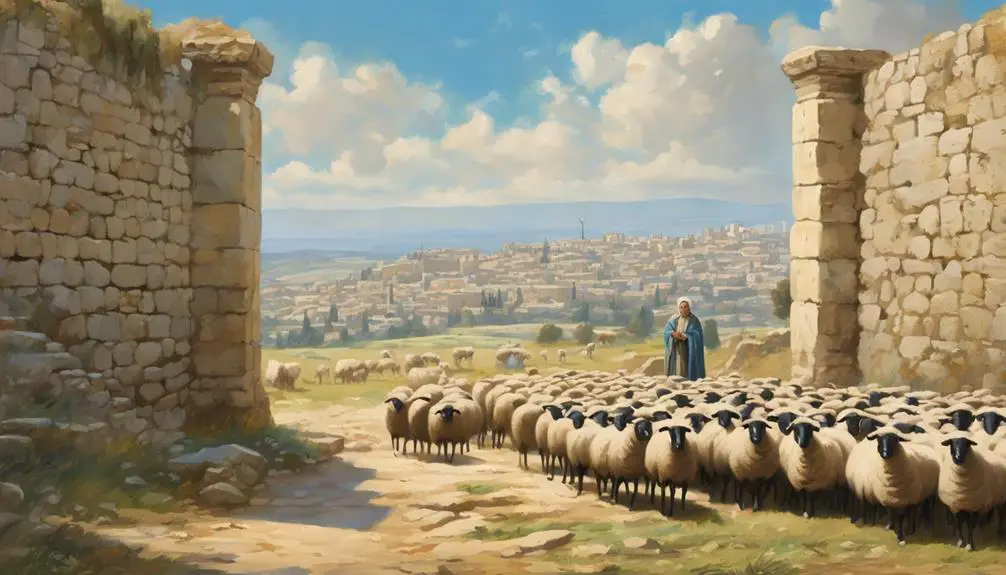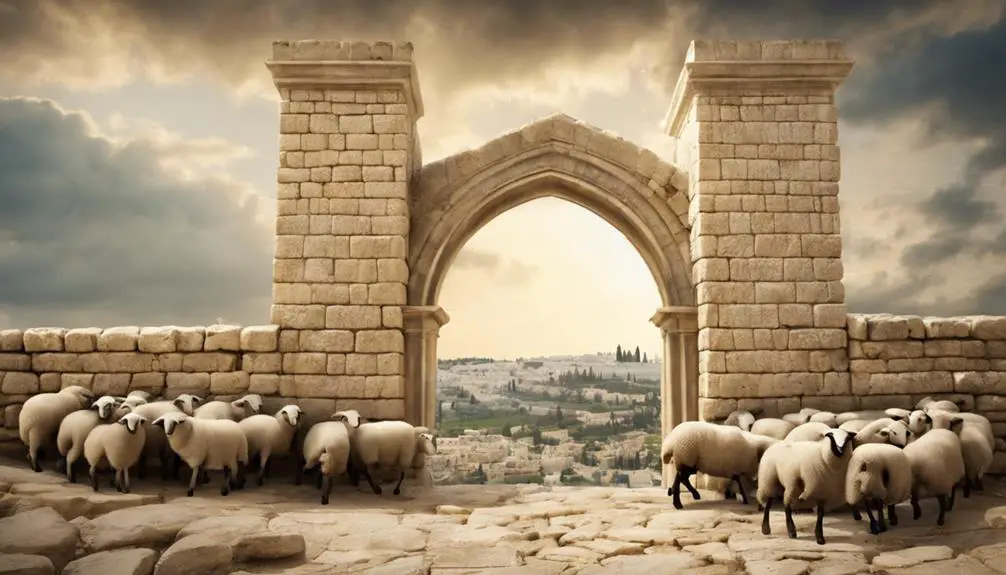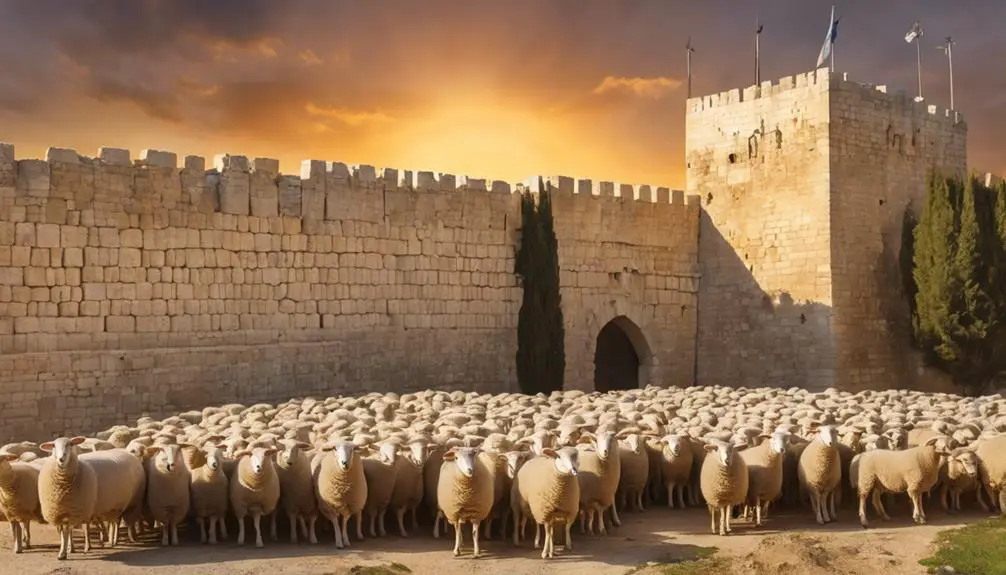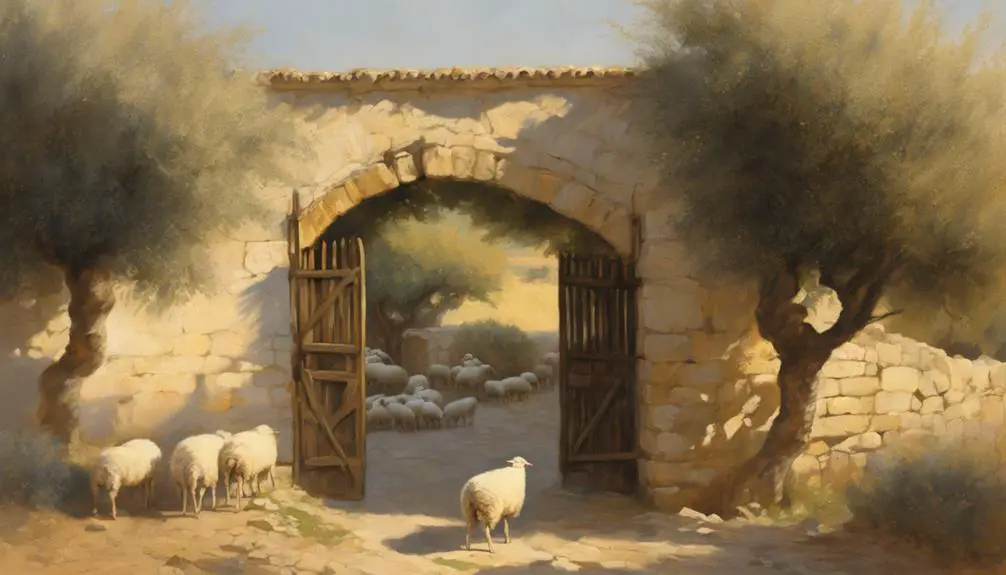Find out the intriguing symbolism behind the Sheep Gate in the Bible; a mystery linking it to Christ as the sacrificial lamb.

What Is the Sheep Gate in the Bible
You may not be aware that the Sheep Gate, mentioned in the Bible, carries significant historical and symbolic implications.
It's referenced in the Book of Nehemiah as one of the gates rebuilt around Jerusalem. However, its symbolism goes beyond a mere city entrance; it's deeply intertwined with the representation of Christ as the sacrificial lamb.
But why is this particular gate associated with such a profound biblical metaphor? Stick around, and we'll unravel these fascinating connections together.
Key Takeaways
- The Sheep Gate, mentioned in the Book of Nehemiah, served as the main passage for sacrificial lambs in ancient Israel.
- Symbolically, the Sheep Gate represents the path to redemption and divine guidance, epitomizing Christian faith and devotion.
- Modern interpretations of the Sheep Gate emphasize its theological significance, symbolizing spiritual protection and God's sovereignty.
- In the contemporary context, the Sheep Gate serves as a symbolic portal of sanctification and a reminder of the need for purification.
Biblical Reference to the Sheep Gate

In the Bible, you'll find the reference to the Sheep Gate in the book of Nehemiah, a gate specifically designed for the passage of sacrificial lambs into the temple. This Gate Structure, strategically placed, held an essential role in the liturgical life of ancient Israel.
The Sheep Gate's unique purpose is evident in its name. It's here where sheep, destined to be sacrifices, entered the sacred city. This gate wasn't just a random entry point, but a carefully thought-out part of the temple's design. It ensured the sheep's path to the altar was direct and free from unnecessary distractions or detours.
The Sheep Sacrifices were a significant aspect of Israel's worship. They were used in various religious rituals, including Passover, guilt offerings, and peace offerings. The Sheep Gate, therefore, wasn't just an architectural feature; it was a theological statement. It communicated the importance of sacrifices in maintaining a relationship with God.
Historical Context of the Sheep Gate

Understanding the historical significance of the Sheep Gate, you'll find it played an integral role not just in the religious rituals but also in the socio-political landscape of ancient Israel. The gate's construction methods were deeply rooted in the ancient practices of masonry, showcasing the architectural prowess of the Israelites.
Situated in the north wall of ancient Jerusalem, its geographical position was strategic. The Sheep Gate provided direct access to the Temple, making it the primary passage for sacrificial animals. This gate, hence, was a hub of socio-religious activities, exhibiting the interplay between religion and politics.
To help you visualize, let's consider this table:
Aspect |
Description |
Importance |
|---|---|---|
Gate Construction |
Employed ancient masonry techniques, reflecting the architectural acumen of the time |
Showcases architectural sophistication of Israelites |
Location (Jerusalem) |
Located in the north wall, provided direct access to the Temple |
Strategic positioning for religious activities |
Socio-Political Role |
Served as the primary passage for sacrificial animals, hence a hub of religious and political activities |
Exhibits interplay between religion and politics |
Considering all these factors, it's clear that the Sheep Gate held a unique and significant place in the socio-religious context of ancient Israel.
Symbolism of the Sheep Gate

Delving into the symbolism of the Sheep Gate, you'll uncover profound theological insights that go beyond its physical structure and strategic location. The Gate's Purpose, often overlooked, is intricately tied to its rich symbolism. It was through this gate that sheep destined for sacrificial rituals were brought into Jerusalem. In this context, the Sheep Gate represents the path to redemption and reconciliation with God, a metaphor for Jesus Christ who's referred to as the 'Lamb of God'.
Exploring further, the Sheep Metaphor is significant. Sheep, in biblical terms, often represent humanity in need of guidance and protection. The gate then symbolizes Jesus as the shepherd, guiding his flock through the path of righteousness and safety. It illustrates a divine plan for salvation and the responsible, protective nature of the shepherd.
Thus, the Sheep Gate serves as a powerful symbol of sacrifice, redemption, and divine guidance. It embodies the journey of the faithful, led by their shepherd, through the gate of salvation. In essence, the Sheep Gate is far more than a physical structure; it's a theological metaphor, encapsulating the essence of Christian faith and devotion.
Sheep Gate in Modern Interpretations

Modern interpretations of the Sheep Gate offer a fresh perspective, inviting you to delve deeper into its theological significance and relevance in today's Christian faith. The architecture of the gate and the historical practice of sheep trading have served as rich metaphors for understanding complex biblical concepts.
The table below provides an overview of the Sheep Gate's representation in modern interpretations:
Interpretation |
Gate's Architecture |
Sheep Trading |
|---|---|---|
Spiritual Protection |
Symbolizes God's protection |
Represents God's provision |
Path to Salvation |
Depicts the narrow and challenging path |
Illustrates the act of redemption |
Divine Authority |
Shows God's sovereignty |
Demonstrates God's control over life and death |
In spiritual protection, the gate's architecture symbolizes God's sheltering nature while sheep trading represents His provision for His people. In the path to salvation, the gate is a metaphor for the challenging journey believers must undertake, and trading sheep signifies redemption. Lastly, in terms of divine authority, the gate signifies God's sovereignty, while sheep trading underscores His control over life and death.
Significance of the Sheep Gate Today

Building on the rich metaphors found in modern interpretations, let's now explore the current significance of the Sheep Gate in contemporary Christian faith and practice. The Sheep Gate's relevance today is more symbolic, but no less profound. The gate, a portal of sanctification, reminds us of our need to be purified before entering the presence of the Holy. It's a visual cue that urges you to examine your life, to cleanse your heart and mind, just as the sheep were cleansed before entering Jerusalem.
The influence of modern architecture on the perception of the Sheep Gate is intriguing. Today's ecclesiastical designs often incorporate elements that echo the Sheep Gate, fostering a connection to the rich biblical history. These architectural cues aren't merely aesthetic; they're thought-provoking, urging you to reflect on the Sheep Gate's symbolism.
Frequently Asked Questions
What Other Gates Are Mentioned in the Bible Apart From the Sheep Gate?"
Apart from the Sheep Gate, you'll find other gates like the Fish Gate, Horse Gate, and East Gate in the Bible. Each gate has its own symbolism and unique gatekeepers.
They're not just physical structures, but signify spiritual transitions and shifts. You'll notice these gates are often associated with significant biblical events, shedding light on divine truths.
Are There Any Archaeological Remains of the Sheep Gate Today?"
You're likely curious about the sheep gate's current status. Unfortunately, there's no direct archaeological evidence of the Sheep Gate from biblical times.
Despite intense gate preservation efforts, it's challenging to definitively identify ancient architecture with specific biblical structures. Historical records and archaeological digs offer insights, but we're still piecing together these complex historical puzzles.
Did Any Significant Biblical Events Take Place at the Sheep Gate?"
Indeed, significant biblical events took place at the Sheep Gate. It's where Nehemiah and his followers rebuilt the Jerusalem wall.
The Sheep Gate's importance is also highlighted in the New Testament, where it's believed Jesus healed a man at the Pool of Bethesda, close to this gate.
The gate's symbolism resonates with themes of sacrifice and redemption, being the passage for sheep led to the temple for sacrifices.
How Did the Sheep Gate Get Its Name?"
You're asking about the naming of the Sheep Gate. It's believed it got its name from its function.
In biblical times, sheep were significant for sacrifices and shepherding. The symbolism of sheep is profound in the Bible. This gate was likely where sheep were led into Jerusalem for these purposes.
Thus, naming conventions of the time would have dictated that the gate be named for its main use – hence, 'Sheep Gate.'
Were There Any Specific Rules or Rituals Associated With the Sheep Gate in Biblical Times?"
In biblical times, you'll find that there weren't specific rituals tied to the Sheep Gate. However, its symbolism played a crucial role. It was where sheep and lambs, used for sacrificial purposes, entered Jerusalem, symbolizing Jesus's sacrifice.
As for gate maintenance practices, it was crucial to keep it in good condition for its sacred role. But, there's no historical evidence of particular rituals or rules connected to its upkeep.
Conclusion
In wrapping up, you've discovered the Sheep Gate's significant biblical, historical, and symbolic roles.
You've learned that it was more than just a physical gateway—it symbolized sacrifice, redemption, and a divine pathway.
Modern interpretations continue to unearth deeper meanings, underscoring its enduring relevance.
So, the next time you encounter the Sheep Gate in your Bible studies, remember, it's a powerful symbol packed with profound theological implications.



Sign up